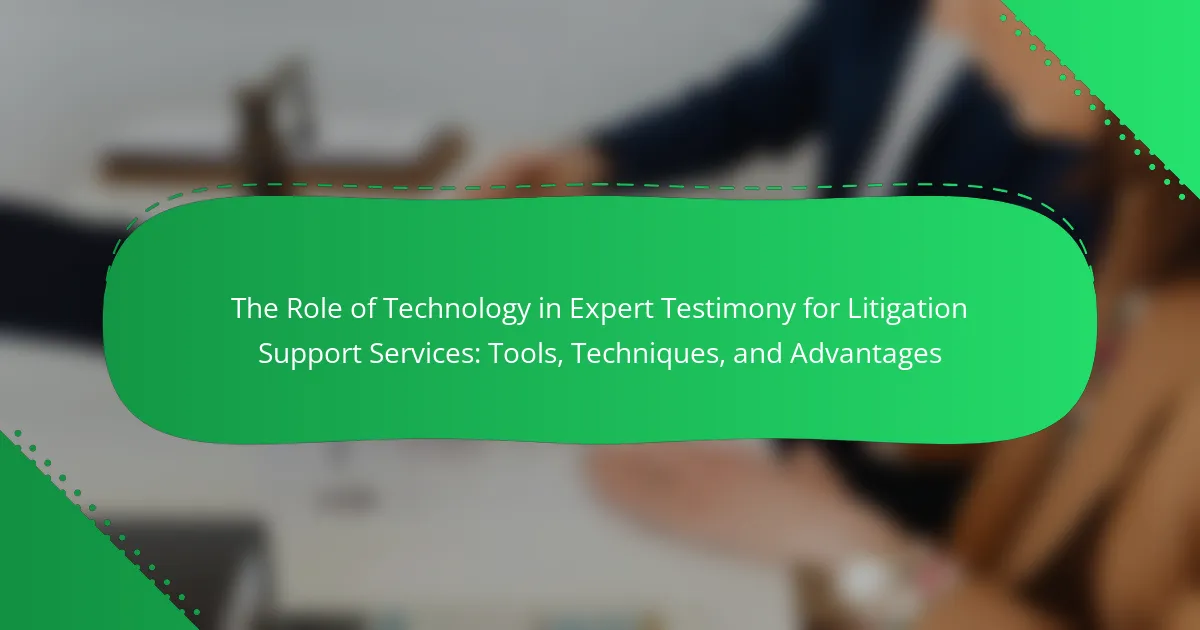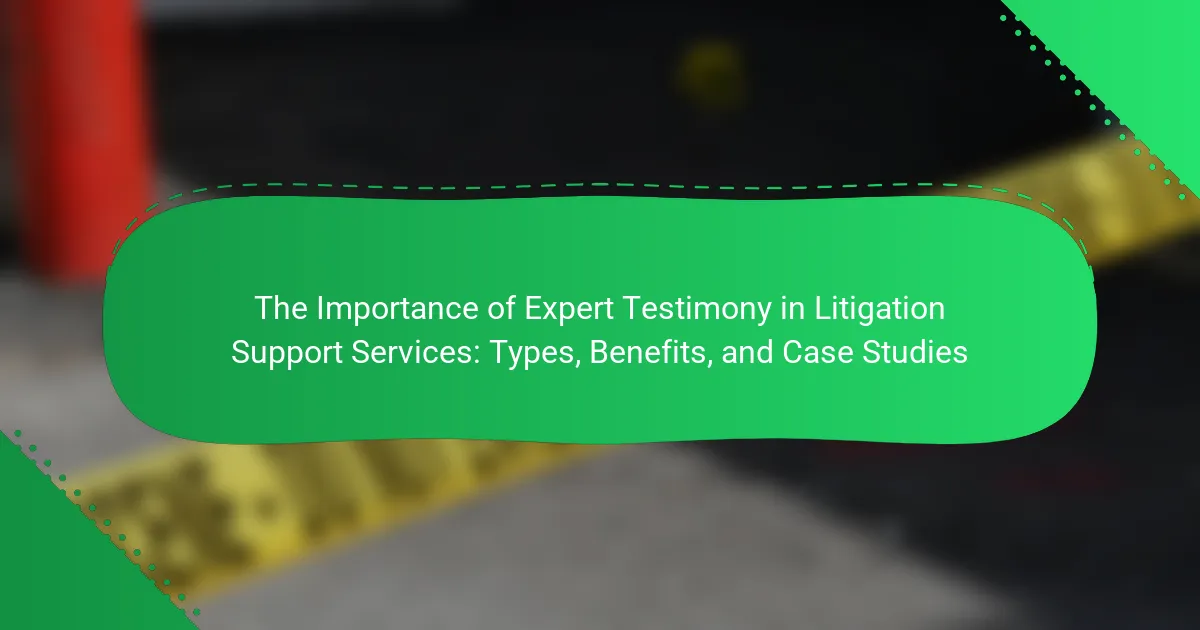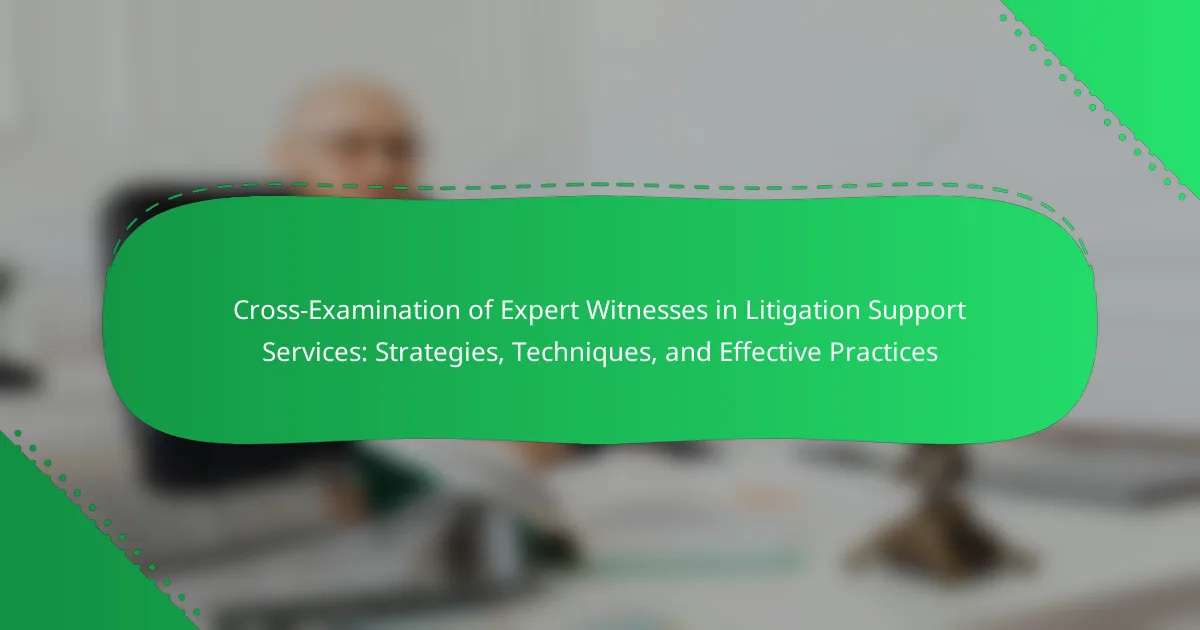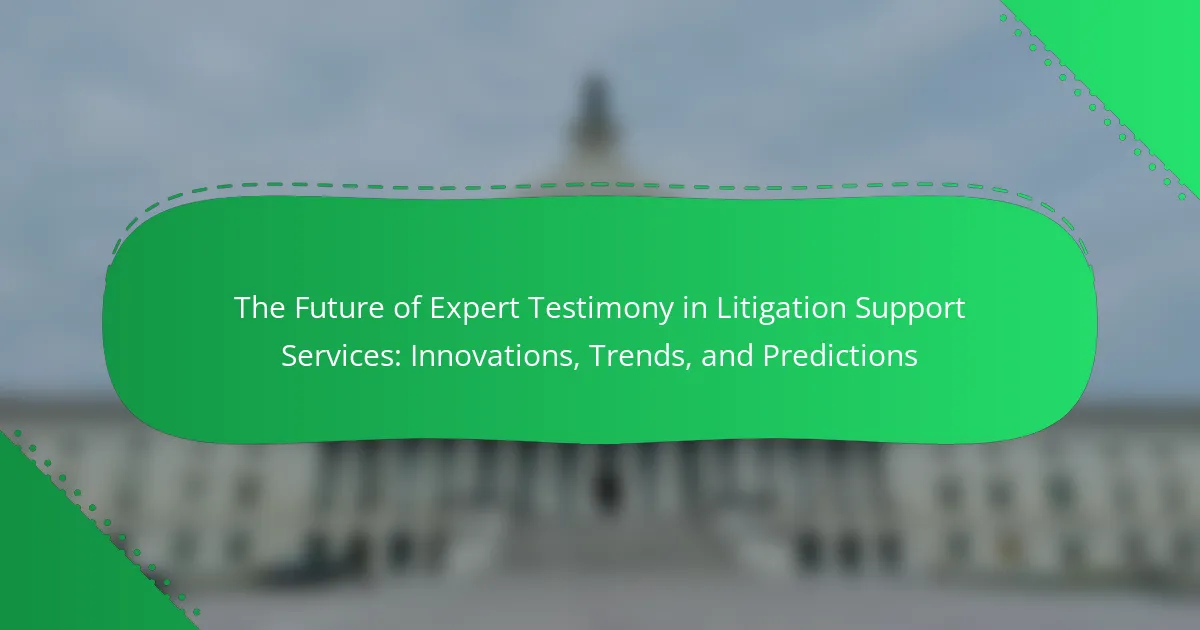Technology significantly enhances expert testimony within litigation support services by improving the accuracy and reliability of evidence presentation. Advanced tools enable experts to analyze complex data efficiently, using software that visualizes data trends and patterns, which helps convey technical information clearly to judges and juries. Remote testimony capabilities through video conferencing expedite the litigation process, while digital platforms ensure secure sharing of documents and evidence, fostering collaboration among legal teams. Overall, the integration of technology in expert testimony greatly elevates its effectiveness in legal proceedings.
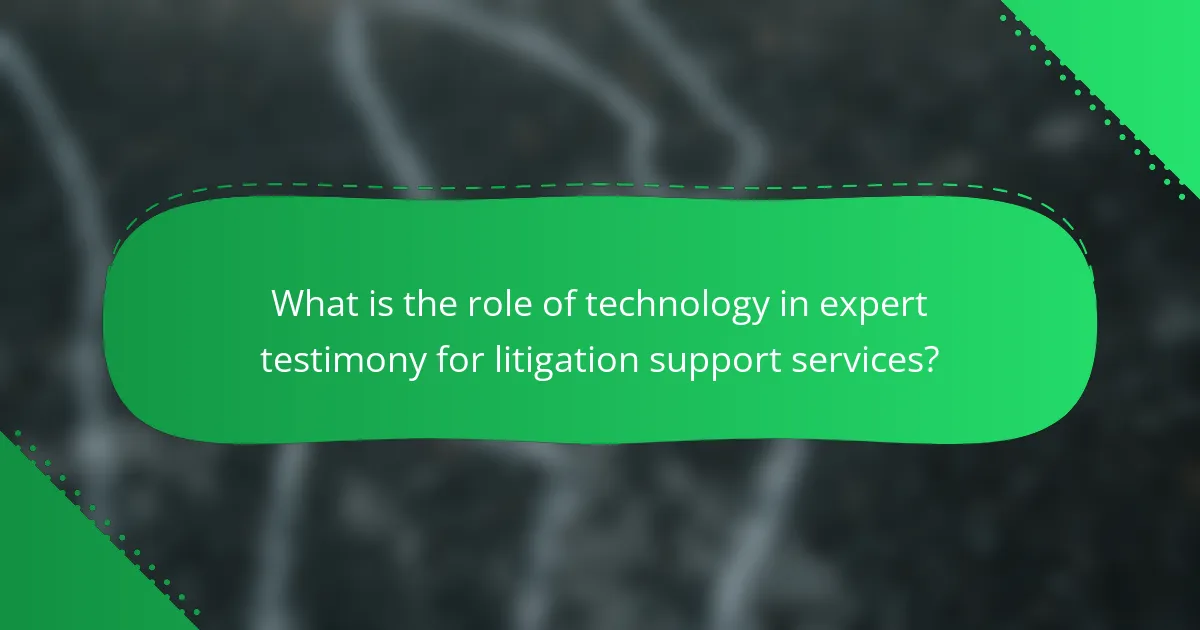
What is the role of technology in expert testimony for litigation support services?
Technology plays a crucial role in expert testimony for litigation support services. It enhances the accuracy and reliability of evidence presentation. Advanced tools allow experts to analyze complex data efficiently. For example, software can visualize data trends and patterns. This clarity aids in conveying technical information to judges and juries. Additionally, technology facilitates remote testimony through video conferencing. This accessibility can expedite the litigation process. Furthermore, digital platforms enable the secure sharing of documents and evidence. As a result, technology improves collaboration among legal teams. Overall, technology significantly elevates the effectiveness of expert testimony in legal proceedings.
How has technology transformed expert testimony in legal cases?
Technology has significantly transformed expert testimony in legal cases. It has enhanced the accuracy and reliability of expert analysis. Digital tools allow experts to analyze complex data more efficiently. Visual aids, such as charts and animations, improve jury understanding. Remote testimony via video conferencing increases accessibility for experts. Software tools enable simulations that demonstrate scenarios clearly. These advancements lead to more persuasive and effective presentations in court. Research indicates that jurors respond better to visual information compared to verbal testimony alone.
What are the key technological advancements impacting expert testimony?
Key technological advancements impacting expert testimony include artificial intelligence, data analytics, and virtual reality. Artificial intelligence enhances the ability to analyze large volumes of data quickly. This allows experts to identify patterns and insights that support their testimony. Data analytics tools enable experts to present complex information in a clear and concise manner. These tools help in visualizing data, making it easier for juries to understand. Virtual reality provides immersive experiences that can illustrate expert opinions effectively. This technology can recreate scenarios relevant to cases, enhancing the credibility of testimonies. Overall, these advancements improve the accuracy, clarity, and impact of expert testimony in litigation.
How do these advancements enhance the reliability of expert testimony?
Advancements in technology enhance the reliability of expert testimony by improving data accuracy and analysis. Tools like predictive analytics and machine learning allow experts to analyze vast datasets efficiently. This leads to more precise conclusions and reduces human error. Enhanced visualization tools present complex data in understandable formats. Clearer visualizations improve juror comprehension and retention of information. Additionally, remote collaboration tools facilitate expert consultations, ensuring diverse perspectives. The use of standardized methodologies increases consistency across testimonies. These factors collectively strengthen the credibility of expert opinions in legal contexts.
What types of technology are commonly used in expert testimony?
Common types of technology used in expert testimony include presentation software, video conferencing tools, and forensic analysis software. Presentation software, such as PowerPoint, helps experts convey complex information visually. Video conferencing tools facilitate remote testimonies and allow experts to participate from various locations. Forensic analysis software assists in examining evidence, providing detailed insights into data or materials relevant to the case. Additionally, simulation software can recreate events or scenarios for better understanding. These technologies enhance clarity, accessibility, and effectiveness in expert testimony.
What are the most popular tools for gathering evidence in litigation?
The most popular tools for gathering evidence in litigation include e-discovery software, document management systems, and forensic analysis tools. E-discovery software, such as Relativity and Logikcull, helps in managing large volumes of electronic data. Document management systems like iManage and NetDocuments streamline the organization and retrieval of legal documents. Forensic analysis tools, including EnCase and FTK, assist in recovering and analyzing digital evidence. These tools enhance the efficiency and accuracy of evidence gathering in legal cases. Their use is supported by the increasing reliance on digital communication and documentation in modern litigation.
How do software applications assist experts in presenting their findings?
Software applications assist experts in presenting their findings by providing tools for data visualization and analysis. These applications enable experts to create clear and compelling presentations of complex data. They facilitate the organization of information in a structured manner. Visual aids such as charts, graphs, and infographics enhance understanding. Software applications also allow for real-time collaboration and feedback. This ensures that experts can refine their findings based on input from peers. Additionally, these tools often support various formats for dissemination, such as reports and interactive presentations. Research shows that effective visual communication can improve retention and comprehension of information. Therefore, software applications significantly enhance the effectiveness of expert testimony in litigation support services.
What advantages does technology provide in expert testimony?
Technology enhances expert testimony by improving accuracy, efficiency, and clarity. Digital tools allow for precise data analysis, leading to more reliable conclusions. Visual aids, such as charts and graphs, help illustrate complex information effectively. Technology also facilitates remote testimony, expanding access to expert witnesses. Advanced software can simulate scenarios, providing compelling evidence. Additionally, technology aids in organizing and managing vast amounts of information. It streamlines communication between legal teams and experts. These advantages collectively strengthen the overall impact of expert testimony in legal proceedings.
How does technology improve the efficiency of the litigation process?
Technology improves the efficiency of the litigation process by streamlining case management and enhancing communication. Digital tools facilitate the organization of documents and evidence, making retrieval faster. Electronic filing systems reduce paperwork and expedite submissions to courts. Virtual meetings allow for quicker consultations and witness testimonies without geographical constraints. Case management software automates scheduling and deadlines, minimizing delays. Data analytics can identify patterns and trends in case law, aiding legal strategies. Overall, these advancements lead to reduced costs and shorter timelines in litigation.
What role does technology play in increasing the credibility of expert witnesses?
Technology enhances the credibility of expert witnesses by providing objective data and advanced analytical tools. Forensic software enables precise analysis of evidence, reducing the chance of human error. Digital presentations can effectively communicate complex information to juries, making it more understandable. Video conferencing allows experts to testify remotely, increasing accessibility and convenience. Data visualization tools help illustrate findings clearly, aiding comprehension. Additionally, technology facilitates the storage and retrieval of case-related information, ensuring that experts can access relevant data quickly. Studies show that jurors are more likely to trust expert testimony supported by visual and data-driven evidence. Overall, technology strengthens the reliability and persuasiveness of expert witnesses in legal proceedings.
How does technology facilitate communication between experts and legal teams?
Technology facilitates communication between experts and legal teams by providing various digital platforms and tools. These platforms include video conferencing, instant messaging, and collaborative document sharing. Video conferencing allows real-time discussions, making it easier to clarify complex issues. Instant messaging enables quick exchanges of information, enhancing responsiveness. Collaborative document sharing tools streamline the review and editing of legal documents. Additionally, project management software helps track tasks and deadlines, ensuring efficient collaboration. According to a study by the American Bar Association, 70% of legal professionals reported improved communication through technology. This evidence supports the assertion that technology significantly enhances interactions between experts and legal teams.
What challenges might arise when integrating technology into expert testimony?
Challenges in integrating technology into expert testimony include reliability, validity, and comprehension issues. Technology may fail, leading to unreliable evidence. Courts often scrutinize the validity of tech-based methods. Experts must ensure their technology aligns with legal standards. Comprehension can be a barrier; jurors may struggle to understand complex tech. Additionally, experts may face difficulties in presenting technology effectively. There may also be concerns over data security and privacy. Lastly, rapid technological changes can outpace legal frameworks, creating regulatory challenges.
What best practices should experts follow when using technology in litigation?
Experts should follow several best practices when using technology in litigation. First, they must ensure data accuracy and integrity. This includes verifying the sources and validity of any digital evidence. Second, experts should maintain clear documentation of all technological processes. This helps in establishing a chain of custody for digital evidence. Third, they should stay updated on relevant technology trends and legal standards. This ensures compliance with current regulations. Fourth, experts should use user-friendly tools for presentations. This enhances the clarity of their testimony. Fifth, they must prioritize cybersecurity. Protecting sensitive information is crucial in litigation contexts. Lastly, experts should engage in continuous training. This improves their proficiency with new technologies. These practices enhance the effectiveness of expert testimony in legal proceedings.
How can experts ensure the accuracy of data presented through technology?
Experts can ensure the accuracy of data presented through technology by implementing rigorous validation processes. They should utilize standardized methodologies for data collection and analysis. Regular audits of data sources and algorithms help identify discrepancies. Cross-referencing data with reputable databases enhances reliability. Training and continuous education on technological advancements are essential for experts. Peer reviews and collaboration with other professionals can provide additional oversight. Documenting all processes and maintaining transparency fosters trust in the presented data. Research indicates that systematic data validation can reduce errors by up to 30%, reinforcing the importance of these practices.
What precautions should be taken to maintain data security during litigation?
Implement strong access controls to maintain data security during litigation. Limit access to sensitive information to authorized personnel only. Use encryption for data at rest and in transit to protect confidentiality. Regularly update software and systems to guard against vulnerabilities. Conduct thorough audits and monitoring of data access and usage. Ensure proper data disposal methods for obsolete information. Establish clear data retention policies in accordance with legal requirements. Provide training for employees on data security best practices to mitigate risks.
The main entity of the article is technology in expert testimony for litigation support services. The article explores the critical role technology plays in enhancing the accuracy, reliability, and effectiveness of expert testimony in legal proceedings. It discusses key technological advancements such as artificial intelligence, data analytics, and virtual reality, which improve data analysis and presentation. Additionally, the article outlines common tools used in expert testimony, the advantages of technology in improving communication and efficiency, and best practices for ensuring data accuracy and security during litigation. Overall, it highlights how technology transforms expert testimony, making it more persuasive and credible in court.
